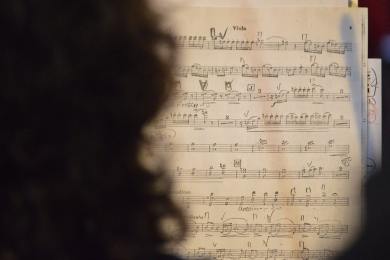Are you an aspiring songwriter? Are you eager to learn how to write great songs? This article will provide you with all the songwriting tips and tricks you need to unlock your creativity and write amazing songs.
Tips on How to Write a Song
Writing a song is no easy feat, but it’s definitely a rewarding experience. Here are some tips to help you get started:
1. Start with the basics. Before you start writing your song, it’s important to have a basic understanding of the fundamentals of music theory. This includes knowing the basics of rhythm, melody, harmony, and structure.
2. Brainstorm ideas. Once you’ve got the basics down, it’s time to start brainstorming ideas for your song. Take some time to think about what you want to write about and what kind of sound you want to create.
3. Free-write. Once you’ve got some ideas, it’s time to start free writing. This is where you write down whatever comes to your mind without worrying about structure or rhyme. This is a great way to explore different ideas and come up with something unique.
4. Try different songwriting styles. There are many different styles of songwriting, so don’t be afraid to experiment. Try writing in a different style than you usually do, or try combining different styles.
5. Record your ideas. You never know when a great idea is going to strike, so it’s important to have a way of recording your ideas. This can be as simple as recording yourself on your phone or using a digital audio workstation (DAW).
Popular Songwriting Styles
Once you’ve got the basics down and you’ve got some ideas for your song, it’s time to start exploring different songwriting styles. Here are some of the most popular styles:
1. Pop. Pop music is one of the most popular genres in the world. It’s characterized by catchy melodies, upbeat rhythms, and simple lyrics.
2. Folk. Folk music is an acoustic style of music that often tells stories about everyday life. It’s characterized by simple melodies and simple chords, and often uses traditional instruments such as the banjo and guitar.
3. Rock. Rock music is characterized by loud guitars, heavy drums, and often angry lyrics. It’s one of the most popular genres of music in the world.
4. Hip-hop/Rap. Hip-hop and rap are two of the most popular genres in the world. Strong rhythms and spoken lyrics characterize it and often uses samples from other songs.
5. Country. Country music is a genre that originated in the United States. It’s characterized by simple melodies, and twangy guitars, and often tells stories of country life.
Storytelling in Songwriting
Storytelling is an important element of songwriting. It’s a great way to engage the listener and make them feel connected to the song. Here are some tips for telling stories in your songs:
1. Develop a character. Before you start writing your story, it’s essential to develop a main character. This can be a fictional character or someone from your life.
2. Create a conflict. Every good story has a conflict, so it’s important to create one for your song. This can be an internal conflict, a conflict between characters, or between the character and the world.
3. Describe the setting. The setting of your story is just as important as the characters and conflict. Use vivid language to describe the setting and make it come alive in the listener’s mind.
4. Show, don’t tell. Instead of simply telling your story, try to show it. Use vivid language and vivid imagery to bring the story to life.
5. Make it relatable. The best stories are those that listeners can relate to. Find ways to make your story relatable to the listener.
Musical Elements in Songwriting
Music is an essential element of songwriting. Here are some tips for making sure your song has the right musical elements:
1. Choose the right instruments. Choosing the right instruments is essential for creating the sound you’re looking for. If you’re not sure what instruments to use, try experimenting with different combinations.
2. Use dynamics. Dynamics are an important part of creating an interesting sound. Try using different volumes, tempos, and textures to create a dynamic and interesting sound.
3. Experiment with different genres. Genres are a great way to give your song a unique feel. Try experimenting with different genres to create something unique.
4. Include a bridge. A bridge is a great way to give your song a dynamic and interesting sound. Try adding a bridge to your song to break up the monotony and keep the listener engaged.
5. Arrange the song. Arranging your song is an important step in creating a great-sounding song. Make sure all the parts fit together to create a cohesive sound.
Emotional Elements in Songwriting
Emotions are an important element of songwriting. Here are some tips for making sure your song has the right emotional elements:
1. Identify the emotion. Before you start writing, it’s important to identify the emotion you want to convey in your song. This will help you craft the right lyrics and melodies to convey the emotion.
2. Use vivid language. Vivid language is a great way to make sure your lyrics are conveying the right emotion. Try using imagery and metaphors to make your lyrics more vivid.
3. Try different melodies. Different melodies can convey different emotions. Try experimenting with different melodies to create the right emotional feel for your song.
4. Experiment with different chord progressions. Chord progressions are an important part of creating the right emotional feel for your song. Try experimenting with different progressions to create the right mood.
5. Play with the tempo. The tempo of your song can have a huge impact on the emotion it conveys. Try playing with the tempo to create the right mood for your song.
Lyric Writing Tips
Writing great lyrics is an essential part of songwriting. Here are some tips to help you write great lyrics:
1. Keep it simple. Don’t overcomplicate your lyrics. Keep them simple and direct.
2. Use vivid language. Vivid language is a great way to make sure your lyrics are memorable and engaging.
3. Tell a story. Stories are a great way to engage the listener and make them feel connected to the song.
4. Use alliteration. Alliteration is a great way to make your lyrics stand out. Try using alliteration to make your lyrics more memorable.
5. Read your lyrics out loud. Reading your lyrics out loud is a great way to make sure they’re conveying the right emotion.
Conclusion
Writing a great song takes time and practice. But with the right songwriting tips, you can unlock your creativity and write amazing songs. We hope these tips have helped you get started on your songwriting journey.
So don’t be afraid to experiment, take risks, and try different styles. With a little bit of hard work and dedication, you can become a great songwriter.
And if you’re ever stuck or need a little extra help, remember that there are plenty of songwriter help resources available to you. So don’t be afraid to reach out and ask for help.
Good luck and happy songwriting!!



